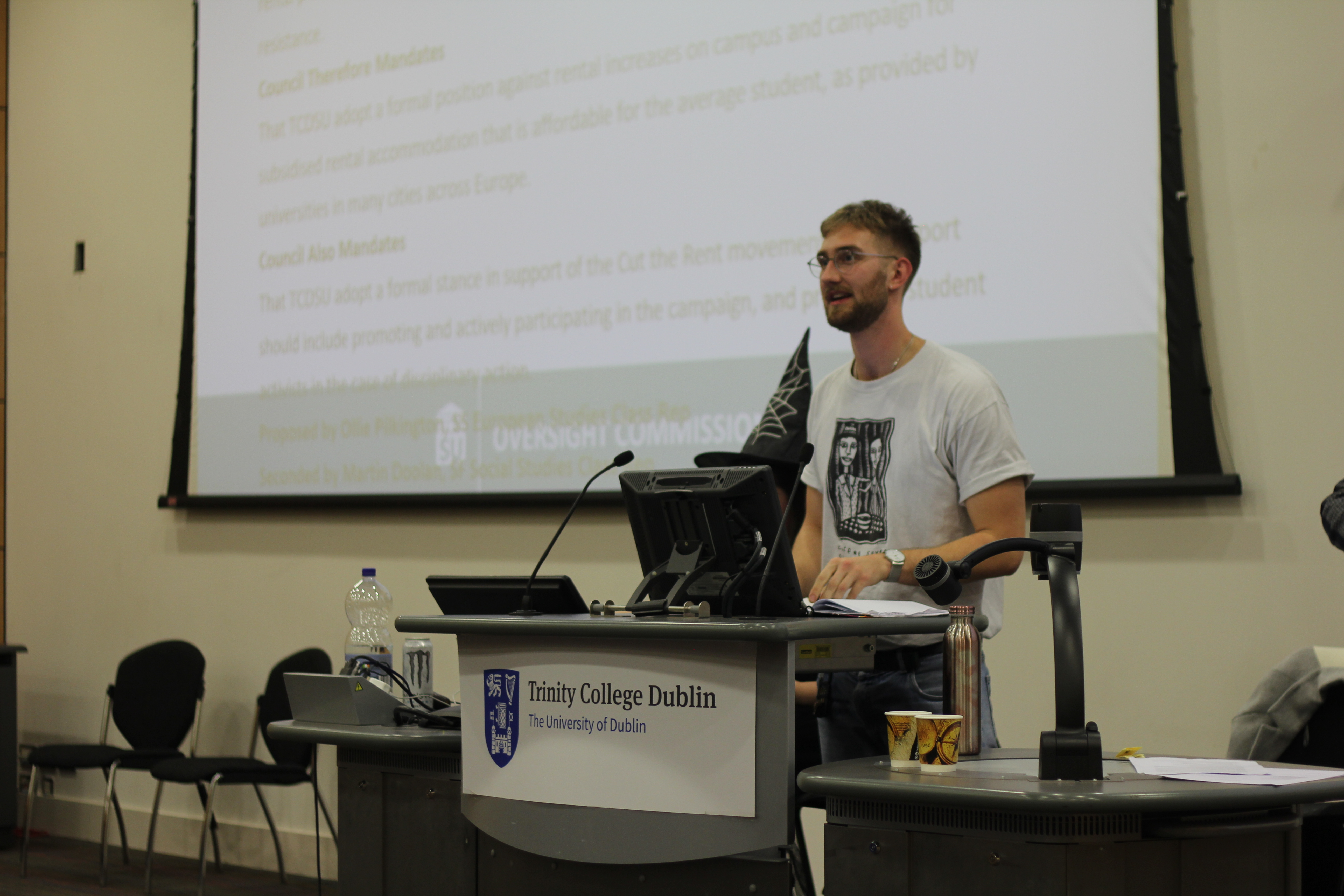Trinity College Dublin Students’ Union (TCDSU) Council has voted against a motion to mandate the union to support the Cut the Rent movement, following lengthy and heated discussion.
The motion, which was defeated, stated that “the continuing housing crisis disproportionately affects students, restricting their educational choices”, and continued, stating: “College has been raising rents at rates of above 8% each year, despite College earning a rental profit of €10.9 million in 2018. Rents will continue to rise unless met with organised resistance.”
In the original motion, Council mandated that “TCDSU adopt a formal position against rental increases on campus and campaign for subsidised rental accommodation that is affordable for the average student, as provided by universities in many cities across Europe. . . . This support should include promoting and actively participating in the campaign, and protecting student activists in the case of disciplinary action”.
The chair requested council members to speak for or against the motion, at which point eight people spoke.
Those who spoke against the motion expressed concern specifically over the final line of the mandate. Council member Charles Sweeney argued that the mandate is a fundamental liability to the SU, as it “is a blank check for protection for student activists” regardless of the legality of activist actions, citing potential violence as behavior that the SU would have to support had it voted to pass the motion.
Cut the Rent member Michael McGrath argued in support of the motion, stating that “when students have confidence that their SU is behind them, they have been able to win real and tangible results,” citing previous efforts taken by SU with the Take Back Trinity campaign.
Xavier Bradley, a member of Cut the Rent TCD, stated that “we cannot guarantee that evictions will not take place,” but that previously “the SU has footed the bill of the dining hall occupation during Take Back Trinity and student’s lives improved”.
Another council member argued against the legality of the motion, stating that “we would lobby for students, but you cannot lobby for a contract to not be enforced. My issue is if students go into this expecting the SU to protect them, when the SU cannot protect them effectively.”
The motion was subsequently amended to state that the union would “stand with” students against disciplinary action rather than “protecting” students against disciplinary action. Some Council members expressed concern that students would believe that the union would be able to protect them against eviction if students withheld rent payment.
A motion was calling to move Cut the Rent’s motion to the next council which was rejected by the chair.
Following significant discussion regarding how the mandate could be reworded to better reflect the ways in which the SU could effectively support the student body in Cut the Rent’s effort, a council member argued: “It’s clearly a flawed mandate. I think we should sum up a vote, and decide on whether this mandate should pass or not”
None of the sabbatical officers spoke either for or against the motion. Four of the sabbatical officers voted for the motion, while TCDSU President, Laura Beston, abstained from the vote.
Cut the Rent TCD is a student led campaign working to reduce rent of student accommodation. They have been canvassing students living on campus to take part in a rent strike, which would involve students withholding the second installment of their rent, due to be paid at the beginning of January.
The demands of the organisation, as laid out at their first meeting, are a significant reduction in rent and for a new fund to be established by Trinity to aid students from economically disadvantaged backgrounds to pay for the cost of accommodation through college.
Also present at the first meeting was Michelle Byrne, Deputy President of the Union of Students in Ireland (USI), who offered her assistance, pledging resources and legal support. She said that she is hoping to make a document on organising rent strikes in Ireland, including legal advice, based on a similar one from Rent Strike UK.
Byrne has offered her support, pledging resources and legal support. She also encouraged the group to ensure a motion is brought to the USI Council supporting their action.
To date, the campaign has not gained as much traction as the Take Back Trinity movement, but the group’s organisers are optimistic of their chances. They argue that on-campus accommodation is the ideal form of accommodation for which to organise a rent strike due to its high-density, which allows door-knocking and garnering of support to occur with relative ease. The group hopes that public dissent from students will encourage College to capitulate in order to uphold its reputation.
A previous version of this article incorrectly stated that Conchúir Ó Ráidaigh spoke in favour of the proposal on behalf of Cut the Rent TCD. In fact, Ó Ráidaigh was not present, and it was Michael McGrath who spoke.






